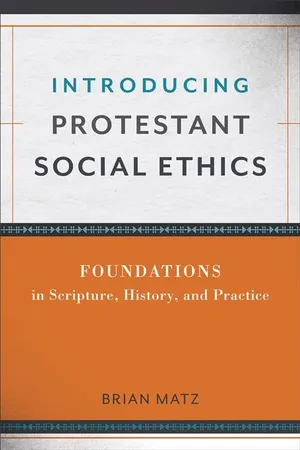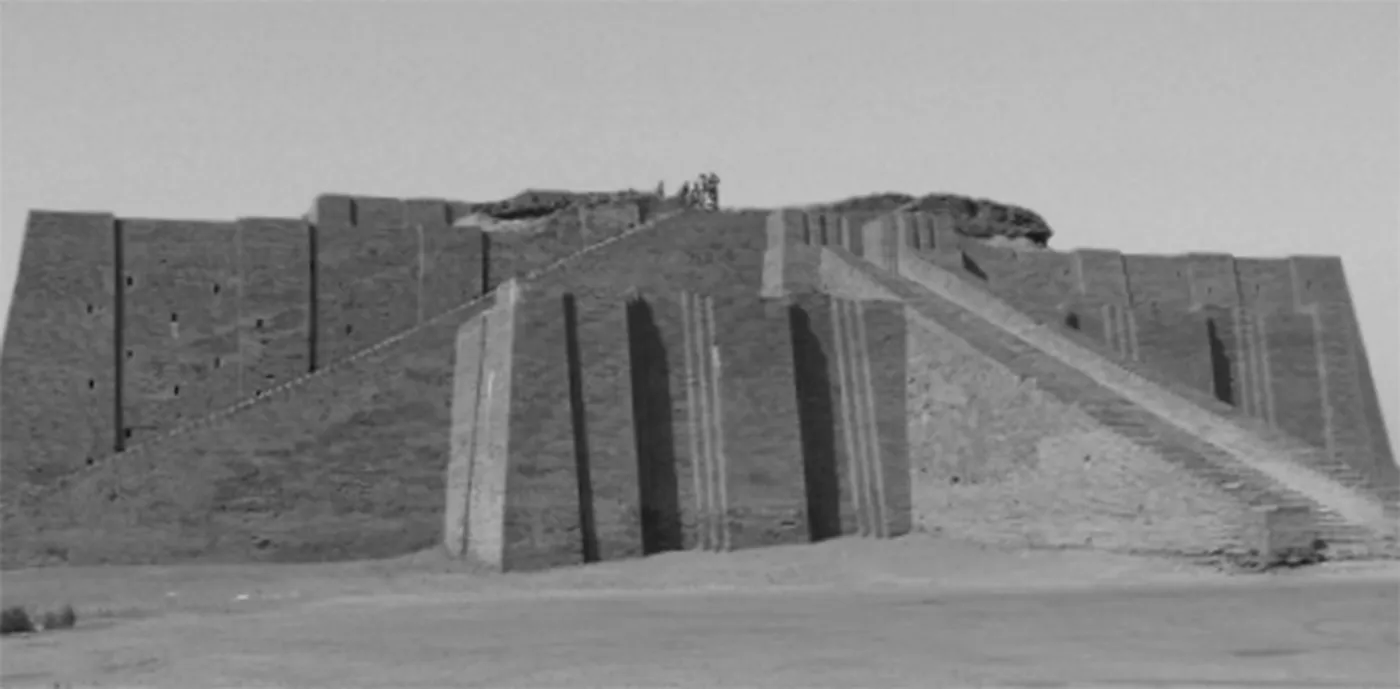
eBook - ePub
Introducing Protestant Social Ethics
Foundations in Scripture, History, and Practice
- 272 pages
- English
- ePUB (mobile friendly)
- Available on iOS & Android
eBook - ePub
About this book
Despite their rich tradition of social concern, Protestants have historically struggled to articulate why, whether, and how to challenge unethical social structures. This book introduces Protestants to the biblical and historical background of Christian social ethics, inviting them to understand the basis for social action and engage with the broader tradition. It embraces and explains long-standing Christian reflection on social ethics and shows how Scripture and Christian history connect to current social justice issues. Each chapter includes learning outcomes and chapter highlights.
Tools to learn more effectively

Saving Books

Keyword Search

Annotating Text

Listen to it instead
Information
PART 1

Social Ethics and Scripture


The Pentateuch
The name “Pentateuch” is given to the Bible’s first five books: Genesis, Exodus, Leviticus, Numbers, and Deuteronomy. They are also known as the books of Law, or Torah, and thus are designated by the T in “Tanakh,” which is the name Jews have given to the collection of books that Christians call the “Old Testament.” Whatever the name given, these books tell some of Israel’s most ancient stories. They describe how the nation of Israel came to be that very nation and record the activities of Israel’s founding families and their leaders.
Most casual readers of these books enjoy the stories in Genesis but, midway through their reading of Exodus, get bogged down in the details of law codes. Few make it through the laws regarding the sacrificial system outlined in Leviticus. Intrepid readers might press on to discover the story of Israel’s forty years of wandering in the wilderness in Numbers. Those who make it all the way through Deuteronomy are generally confused, in the end, by the seemingly chaotic mass of laws, regulations, and practices. Rest assured, there is an order, a system, a logic (if you will) to these books and to their manner of presenting Israel’s law code, and it is quite beautiful once one digs deeper to understand them.1 Yet our purpose here is to focus instead on some key themes that emerge from across these tales of patriarchs, religious leaders, law codes, sacrifices, victories, and defeats. Our purpose is to unearth what these stories have to teach us about who God is, what God seeks from his followers, and to what type of society we ought to be contributing our energies.
Summary of the Contents of the Tanakh / Old Testament
| Torah / Pentateuch | Neviʾim / Prophets | Ketuvim / Writings |
| Narrates stories of Israel’s earliest history | Describes events occurring during the ninth to fifth centuries BC | Describes events occurring during the twelfth to sixth centuries BC |
| Describes the law code given to create a structure for Israelite society | God speaks to Israel through the voices of various prophets | Tells of the split of the nation into two parts: Israel (north) and Judah (south) |
| Recounts the lives of prominent individuals in Israel’s history –Noah –Abraham –Isaac –Moses | Texts record God’s judgment on Israel and on Judah for their infidelity to God and to the law code | Records activities of the kings of Israel and Judah |
| Records events surrounding the exile of Israel to Assyria and of Judah to Babylon | ||
| Includes Wisdom literature (Proverbs, Ecclesiastes) | ||
| Includes poetry (Psalms, Song of Songs) |
What does this search yield? It reveals that God takes pleasure in order. It further reveals that humans seem to take far too much pleasure in disorder, in sin. Consequently God repeatedly steps in to restore order, to heal the broken pieces of people’s lives, to renew their spirits, and to give them ever-new chances in building a better future for themselves and society. The Christian tradition calls this grace. The Pentateuch reveals that God’s grace even outruns our disordered affections. God is restoring order even when we are in the midst of bringing about disorder! This is a beautiful picture of God, of God’s grace, and of the type of social justice in which everyone is invited to participate.
One further feature of the Pentateuch deserves our attention here. Repeatedly the text reveals that God takes a special interest in and has particular compassion for the struggles faced by foreigners, immigrants, or, as the text often says, by strangers. The Pentateuch puts a real face—many faces—on the myriad injustices that strangers face. In our interconnected world today, the plight of those who travel to new lands for work or other opportunities is equally pronounced. This is a socioethical problem in our day as much as it was in Israel’s earliest days.
God Takes Pleasure in Order
A distinctive feature of the Pentateuch is its concern with order. The reader discovers this right away in the opening chapters of Genesis. “Now the earth was without shape and empty, and darkness was over the surface of the watery deep” (Gen. 1:2 NET). In short, matter was in a chaotic heap. No shape. Empty of meaning. Dark. An abyss. Centuries later, the Greeks understood something similar about those earliest days. Hesiod wrote in his Theogony, a Greek creation story, “Truly, at the first, Chaos came to be,” and from chaos sprang everything that exists.2 In Genesis, God molds this chaotic mass into something wonderful, something beautiful, something good. There is light. There is separation of land from water and of cosmic spheres from one another. Even movement is ordered. Elements within that cosmic realm evolve into patterned orbits. Rotations of planetary bodies allow for shifts between day and night, between seasons, and between temperatures. The rotations of earth subsequently foster life, and God creates myriad vegetation, fish, birds, and other animals, including especially humans. Finally, there is rest. A sufficient equilibrium has been reached that God may be said to rest at the end of his creative activity. The order resulting from the chaos is deemed not merely good, but very good.
Yet the reader of Genesis soon discovers that all is not well on the earth for long. Human activity eventually yields rejection of belief in God. Genesis 3 and 4 record stories about Adam, Eve, Cain, and Lamech, who each reject God by acting in ways that they think are better for themselves. So in Gen. 7, somewhat surprisingly, the reader discovers that God bears an equal capacity to return the ordered world back to chaos. With Noah, his family, and some animals safely ensconced on a type of boat, Gen. 7:11 tells us, “All the fountains of the great deep burst open and the floodgates of the heavens were opened” (NET). A quick check of Gen. 1:6–7 reveals that what was happening in Gen. 7:11 is a return to the original chaotic state. Those waters that once were separated reunite. Chaos is back. Thankfully, however, the chaos restored by God does not last long. Eventually, as the reader discovers, God decides to bring a new order out of this new chaos, and we find the same events in Gen. 8 as in Gen. 1. A wind from God comes to restore order (Gen. 8:1). A separation is made between the waters above and the waters below (Gen. 8:2–3). Land appears (Gen. 8:4). Vegetation eventually is revealed (Gen. 8:11). Finally, the animals and humans are set free to roam about the earth (Gen. 8:15–19).

The ziggurat temple at Ur (located in the province of Dhi Qar in southern Iraq). [Kaufingdude (Wikimedia Commons CC BY-SA)]
So from the very beginning of the Pentateuch the reader encounters a God capable not only of bringing order out of chaos but even of bringing chaos out of order. In either case, God is firmly in control, since even the chaos of Gen. 7 had a particular purpose. There are many similar events in the rest of the Pentateuch (e.g., the gift of manna in the Sinai wilderness is later spurned by Israel, and so God sows chaos into the community through an inordinate supply of quail; see Exod. 16 and Num. 11:31–33). Those stories introduce the reader to a faith in a God who providentially cares for a beautiful, wonderful world, and they do so even while showing that more often than not the inhabitants of that world turn away from their creator. Every new chaos is brought to some new level of order by God.
Not long after the deluge, the chaos of disbelief in the true God returned. But rather than fixing this new chaos with another re-creation event, God chose a much slower, more halting, but arguably more appreciable method. God chose to address this new chaos by building a special relationship with a family. God selects a resident of Ur (in modern-day Iraq) named Abram (later Abraham) and his wife, Sarai (later Sarah).3 Evidence from archaeological excavations of his hometown suggests Abram began his life as a worshiper of a moon-god. However, God calls him out of that lifestyle, and a story of conversion gradually unfolds. Abraham’s subsequent travels around the ancient Near East and in Egypt reveal that he alone worshiped this new God, Yahweh. His story, and the story of his descendants, then, is one in which Yahweh gradually reintroduces himself to the human race. A new day of restoring order from chaos had begun. However, this time the restoration process would take far more years than anyone could then or can now imagine.
The Pentateuch records numerous chaotic events within the story of Abraham and his descendants. Abraham, it turns out, had a propensity to lie. More than once God had to rescue Sarah and him from the frightening situations into which they had gotten themselves as a result of these lies.4 Lying and deceit were like a twisted gene that was passed on to every one of Abraham’s descendants. God repeatedly had to rescue Abraham’s son Isaac and Abraham’s grandsons Esau and Jacob from situations in which their deceit had gotten them into trouble. Mutual hatred and deceit landed Abraham’s great-grandson Joseph into a slave’s existence in Egypt, which had the unfortunate consequence of eventually landing all of Abraham’s descendants into slavery in Egypt. The book of Exodus recounts how God came to their rescue more than once too.
Similarly, the story of Moses’s leadership of Abraham’s descendants, by then called Hebrews or Israelites, was one of halting steps forward as God restored worship of himself to the earth. God provided a miraculous escape for the Israelites from Egyptian slavery. God provided leaders to direct the map-less people from Egypt back to Abraham’s former land in Palestine. God provided a law code to govern the Hebrews’ social and ceremonial affairs. When discipline was needed, God provided it. When food was needed, God provided it. When water was needed, God provided it. The stories of Exodus, Leviticus, and Numbers recount the innumerable ways in which God was restoring order out of the chaos of the Hebrews’ lives.

Mount Sinai in the Sinai Peninsula. [© Baker Publishing Group and Dr. James C. Martin]
These texts equally reveal that God was seeking a gradual restoration of knowledge of himself throughout the world. Take special note of Exod. 19. After escaping from Egypt, the Hebrews had arrived at the base of Mount Sinai, in that peninsula shared by Egypt and Israel today. Through the voice of Moses, God gave the Hebrews there the text of a law code they were to follow. The text in Exod. 19:5–6 informs us that, if the Hebrews followed this law code, they would be provided with at least three blessings: (1) they would be God’s special possession; (2) they would be a kingdom of priests; and (3) they would be sacred, or set apart for a particular purpose.5
Note especially the second of these blessings. The Hebrews were to enjoy the blessing of being a kingdom of priests. Priests serve congregants. Priests inform congregants about God. If all the Hebrews were priests, who were their congregants? In the later books of the Old Testament, the answer becomes clear: the rest of the people in the world.
Thus Exod. 19 finally reveals to the reader what God sought from this special relationship with Abraham and his descendants all along. They were to be God’s mouthpieces to the world. They were to preach to the world the beauty and the greatness both of God and of having a relationship with God. Their relationship with God was ...
Table of contents
- Cover
- Title Page
- Copyright Page
- Dedication
- Contents
- Acknowledgments
- Abbreviations
- Introduction
- Part 1: Social Ethics and Scripture
- Part 2: Social Ethics in Christian History
- Part 3: Principles for Protestant Social Ethics
- Notes
- Scripture Index
- Subject Index
- Back Cover
Frequently asked questions
Yes, you can cancel anytime from the Subscription tab in your account settings on the Perlego website. Your subscription will stay active until the end of your current billing period. Learn how to cancel your subscription
No, books cannot be downloaded as external files, such as PDFs, for use outside of Perlego. However, you can download books within the Perlego app for offline reading on mobile or tablet. Learn how to download books offline
Perlego offers two plans: Essential and Complete
- Essential is ideal for learners and professionals who enjoy exploring a wide range of subjects. Access the Essential Library with 800,000+ trusted titles and best-sellers across business, personal growth, and the humanities. Includes unlimited reading time and Standard Read Aloud voice.
- Complete: Perfect for advanced learners and researchers needing full, unrestricted access. Unlock 1.4M+ books across hundreds of subjects, including academic and specialized titles. The Complete Plan also includes advanced features like Premium Read Aloud and Research Assistant.
We are an online textbook subscription service, where you can get access to an entire online library for less than the price of a single book per month. With over 1 million books across 990+ topics, we’ve got you covered! Learn about our mission
Look out for the read-aloud symbol on your next book to see if you can listen to it. The read-aloud tool reads text aloud for you, highlighting the text as it is being read. You can pause it, speed it up and slow it down. Learn more about Read Aloud
Yes! You can use the Perlego app on both iOS and Android devices to read anytime, anywhere — even offline. Perfect for commutes or when you’re on the go.
Please note we cannot support devices running on iOS 13 and Android 7 or earlier. Learn more about using the app
Please note we cannot support devices running on iOS 13 and Android 7 or earlier. Learn more about using the app
Yes, you can access Introducing Protestant Social Ethics by Brian Matz in PDF and/or ePUB format, as well as other popular books in Theology & Religion & Christian Theology. We have over one million books available in our catalogue for you to explore.